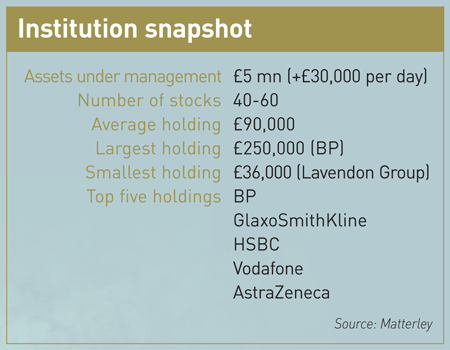Cost-cutting stories to be replaced by M&A in 2010, says George Godber of Matterley's S&W Undervalued Returns Fund
Investment firm Matterley was launched in August 2008, just one month before the bloated balance sheet of Lehman Brothers went pop. As a result, it is fitting the asset management firm chooses to focus on balance sheet strength above all else.
‘The way we do everything is through balance sheet analysis,’ explains George Godber, co-manager of Matterley’s S&W Undervalued Returns Fund. ‘We’re trying to buy firms below their tangible book value and take long-term positions where we think the market is overlooking the true value of a business.’
Godber, a former investment banker at Credit Suisse, where he worked in equity sales, manages the fund with Henry Dixon, a former stock picker for New Star Asset Management. The two met on business, became friends and hatched a plan to start their own fund. This led to the launch of Matterley 20 months ago.
The demise of Lehman meant the two men had a tough start. Following a tie-up with stock broker Charles Stanley, however, the firm and its one fund are now growing steadily. Current assets under management are modest at around £5 mn ($7.8 mn), but funds are growing at a rate of around £30,000 a day, says Godber, who has set a target of £500 mn.
Inflows have been helped by a strong performance in 2009, when the fund made a 39 percent return. Godber thinks 2010 will be a trickier market, however. ‘I’m very optimistic, but we do have significant worries,’ he notes. ‘One: what happens when interest rates start to go up, as they will have to? Two: ill-founded government intervention. Authorities are trying to curb what they see as excesses, but it’ll end up withdrawing credit from the real economy.’
On the positive side, Godber predicts global growth to be much stronger than analysts forecast. For him, cost-cutting stories have largely run their course, so the next way for companies to deliver earnings growth will be through acquisitions. This is all the more likely as corporate cash levels are at record highs, he adds.
He doesn’t look for possible targets when picking stocks but, by buying undervalued firms, it is always a possibility. ‘Last year we owned a recruitment consultant called Spring Group that had a lot of cash on the balance sheet, but the market attached no value for the underlying business,’ Godber recalls. ‘Swiss company Aggreko just came in and bid for it.’
Godber believes good IR can lead to an upgrade in a company’s shares. ‘One example, where we have an investment, is Kazakhmys, a Kazakhstani mining company listed in London,’ he says. ‘It used to have the feel of a company that was not up to the standards of other mining firms listed in London, although that wasn’t actually the case if you looked at the board. Even so, it hired an IRO, John Smelt, a former fund manager who knows both sides of the process. Over time that gets investors a lot more comfortable with the company.’
GlaxoSmithKline (GSK) is another top performer, according to Godber. ‘I recently saw the IRO at GSK, David Mawdsley,’ he recalls. ‘It was a superb meeting: very clear, upfront and open, not just a big advert for Glaxo. He explained what the challenges are and how GSK is going to tackle them. I left feeling incredibly confident about our investments in the company, and we actually increased our position.’
Godber concedes, though, that the IR function is much easier for big companies with plenty of resources, like GSK. ‘Glaxo probably has a big team,’ he notes. ‘I think it’s difficult for the small companies to accept that they have to hire someone to do IR.’
Clear and simple
Because of the fund’s investment philosophy, companies with large, opaque balance sheets are out of the question, ruling out stocks like the Royal Bank of Scotland (RBS). ‘RBS is difficult to analyze with the wind-down of ABN Amro,’ says Godber, who is also worried government interference is hampering the bank’s efforts to get back on its feet. ‘It’s losing really good people. We need it to be run to the best of its ability, to make as much as possible.’
Overall, Godber is mixed on UK bank stocks, labeling them ‘an unclear sector with some clear winners’. For him, one of the top picks from any sectors has to be HSBC, which he describes as a unique franchise and the best-positioned company globally to take advantage of what’s happening in Asia.
‘HSBC may end up with 10 percent of the Chinese credit card market; that’s incredible when you think about it,’ he points out. ‘It’s very well run, very conservative, has more deposits than loans, a very safe balance sheet – and is something we hold.’










